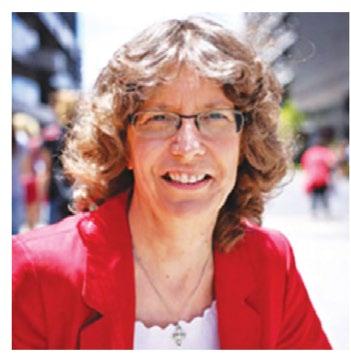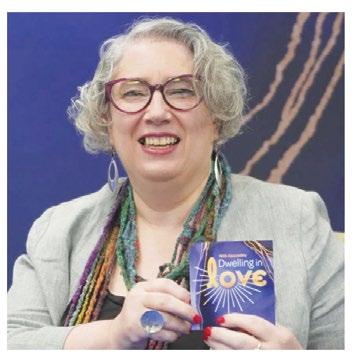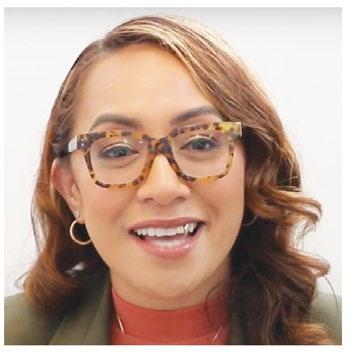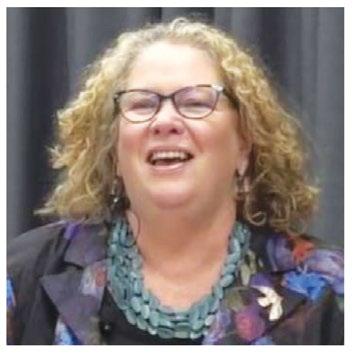
4 minute read
An Informed Faith
Adapted from an article by Rev John T Squires
The exercise by men and women of the gifts God bestows upon them: celebrating women in leadership in the Uniting Church.
The National Assembly of the Uniting Church in Australia recently installed the Rev. Sharon Hollis as President of the Assembly for the next three years (2021–24).
At the same meeting (being held online because of the COVID pandemic), members of the Assembly elected a female PresidentElect, the Rev Charissa Suli, who will serve as President-Elect for three years, and then she will take up the position of President in July 2024. For the next three years, the President, the Past President, and the President-Elect will all be females: the Rev Sharon Hollis, Dr Deidre Palmer, and the Rev Charissa Suli, respectively. In addition, the current General Secretary of the Assembly is also female: Colleen Geyer. Her term has just been extended by the current Assembly. It is a striking symbol, when considering the national leadership of Christian churches across Australia, that all of our key leadership are female. The symbolism is potent, when Heads of Churches gather: women in such ranks have, to this point, been somewhat rare. The Uniting Church contribution has been, and will continue to be, a reminder, of the importance of providing a female perspective when issues of national social and political importance are being considered. (It’s a message that our national political leadership seems incapable of hearing and implementing—despite the power of the #EnoughIsEnough movement from earlier this year.) Women in leadership is not an unusual thing for the UCA. Women have served in leadership roles in a number of denominations. But amongst the historic mainstream denominations, the Uniting Church stands out from Roman Catholic and Anglican Churches, with many more women stepping forward into leadership.
The same comparisons can be drawn with Baptist, Church of Christ, and Pentecostal churches over the past half century.
This is completely consistent with the affirmation made in the Basis of Union— the document on which the formation of the Uniting Church was based. Paragraph 13, after recognising the existing ministries in the three participating denominations at the time of union, states, ‘The Uniting Church will thereafter provide for the exercise by men and women of the gifts

God bestows upon them, and will order its life in response to God’s call to enter more fully into mission’. This was consistent with the practice of those three earlier denominations, which each had ordained women to serve in ministry.
Indeed, this practice is also consistent with the fundamental theological affirmation made earlier in paragraph 13 of the Basis, declaring that the church ‘acknowledges with thanksgiving that the one Spirit has endowed the members of Christ’s Church with a diversity of gifts, and that there is no gift without its corresponding service: all ministries have a part in the ministry of Christ.’ This, of course, derives from the crystal clear affirmations about the gifting of the Spirit that Paul makes in 1 Corinthians 12. The Spirit knows no limits of gender in gracing individuals with gifts for ministry. And Paul was completely accepting and affirming of women in ministry leadership as partners with him in the work they were undertaking. So, women in key leadership roles is a practice consistent with scripture and in accord with the central values and practices of the Uniting Church. Along with the women already noted in the opening paragraphs, a number of the Synods have also had female Moderators. Currently, there are three female Moderators: Thresi Mauboy Wohangara in the Northern Synod, Denise Liersch in VicTas, and Susy Thomas, in WA. The Rev Charissa Suli, a second-generation Australian of Tongan heritage, is the first person of non-Anglo origins to serve in the National leadership role, although some Synods have elected non-Anglos as Moderators. The age of Charissa Suli is striking: she is a ‘young person’ by church reckoning, having been ordained for just seven years, and still being in her thirties. That must surely be something not often seen in church leadership. Of course, all of this recounting of females in prominent leadership roles hasn’t yet taken into account the numerous females who have served as Chair of Presbyteries, Church Councils, and Congregations—to say nothing of the thousands upon thousands of females serving as active members of Congregations and Fellowship Groups and living out their discipleship in community groups right around the country. Females outnumber males within the church by a factor of at least 2:1, so it is way beyond time that our leadership reflects this! Nevertheless, the array of leadership we can point to is a sign of our commitment as a church, to be open to the moving of the Spirit. We have seen that in the gifted leadership of Dr Tabart (who signed the Covenant relationship with the United Aboriginal and Islander Christian Congress in 1985) and Dr Palmer (who has steered the church through the difficulties of the 2018 decision about marriage, and who has been key to the development of a fine resource on domestic violence in 2021).
May that be what transpires under the leadership of Sharon Hollis, our first ordained female President, and then Charissa Suli, our first Pacific Islander female President.


From left to right: 15th President Dr Deidre Palmer, General Secretary of the Assembly Colleen Geyer, Rev Charissa Suli and Rev Sharon Hollis recently installed as the 16th President of the Uniting Church.








